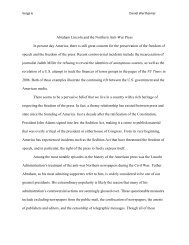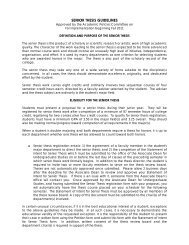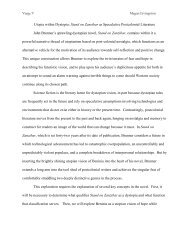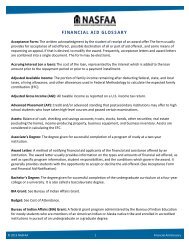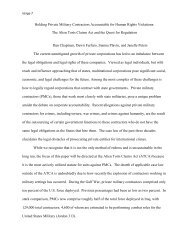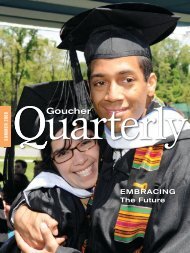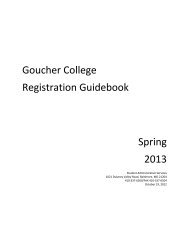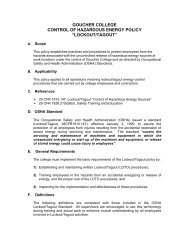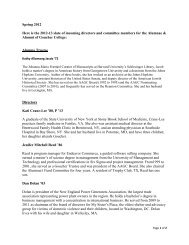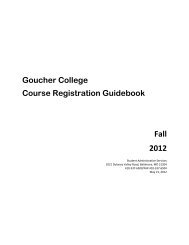Ambivalent Freedom in Byron's Mazeppa
Ambivalent Freedom in Byron's Mazeppa
Ambivalent Freedom in Byron's Mazeppa
Create successful ePaper yourself
Turn your PDF publications into a flip-book with our unique Google optimized e-Paper software.
Verge 8<br />
David E. Ford, Jr.<br />
"Thus bound <strong>in</strong> nature's nakedness":<br />
<strong>Ambivalent</strong> <strong>Freedom</strong> <strong>in</strong> <strong>Byron's</strong> <strong>Mazeppa</strong><br />
We must leave this trim, f<strong>in</strong>ite room and go to confront the <strong>in</strong>f<strong>in</strong>ite.<br />
—Kenneth Clark 1<br />
<strong>Byron's</strong> verse-romance <strong>Mazeppa</strong> occupies an uncerta<strong>in</strong> position <strong>in</strong> the poet's body of<br />
work. Though composed contemporaneously with the first Canto of his acknowledged<br />
satiric masterpiece, Don Juan, <strong>Mazeppa</strong> appears, on the surface, at least, to have more <strong>in</strong><br />
common with older, more recognizably Byronic romances, such as The Giaour and The<br />
Corsair. Indeed, many critics seem uncerta<strong>in</strong> <strong>in</strong> their evaluations of the poem's significance,<br />
often dismiss<strong>in</strong>g or leav<strong>in</strong>g it off altogether. William H. Marshall crystallizes this scholarly<br />
ambivalence when he notes, <strong>in</strong> "A Read<strong>in</strong>g of <strong>Byron's</strong> <strong>Mazeppa</strong>," that "<strong>Byron's</strong> <strong>Mazeppa</strong> is at<br />
once a more serious and more humorous poem than has been suggested" (120). In Byron and<br />
the Ru<strong>in</strong>s of Paradise, Robert F. Gleckner dismisses <strong>Mazeppa</strong> as a throwback, attribut<strong>in</strong>g his<br />
own disda<strong>in</strong> for the work to <strong>Byron's</strong> example: "Byron himself, quite rightly, thought rather<br />
little of [<strong>Mazeppa</strong>]. [It] was a return to what was a mode that he had grown far beyond"<br />
(307). Perhaps the most jarr<strong>in</strong>g anecdotal evidence of the collective critical shrug <strong>in</strong>duced by<br />
<strong>Mazeppa</strong> is the poem's omission from the Norton Critical Edition of <strong>Byron's</strong> Poetry and Prose,<br />
edited by Alice Lev<strong>in</strong>e and published <strong>in</strong> 2010. Critical neglect aside, a close exam<strong>in</strong>ation of<br />
<strong>Mazeppa</strong> reveals that it is an important development <strong>in</strong> the Byronic conception of autonomy<br />
and that, <strong>in</strong> many ways, it is more directly anticipatory of Don Juan than its more formally<br />
Don Juan-esque predecessor, Beppo. In his retell<strong>in</strong>g of the story of <strong>Mazeppa</strong>'s violently<br />
constra<strong>in</strong>ed rocket<strong>in</strong>g <strong>in</strong>to the <strong>in</strong>f<strong>in</strong>ite, Byron enacts a dialectic of ambivalence, posit<strong>in</strong>g a<br />
1 Kenneth Clark. Civilisation, Episode 12 "The Fallacies of Hope." BBC, 1969.
Verge 8 Ford 2<br />
paradoxical notion of freedom that is made possible only through acknowledgment and<br />
submission to the radical bondage of a determ<strong>in</strong>istic existence.<br />
The constra<strong>in</strong>ts of fate and chance and the underly<strong>in</strong>g lack of freedom these suggest<br />
are a predom<strong>in</strong>ant motif from <strong>Mazeppa</strong>'s open<strong>in</strong>g l<strong>in</strong>es. Byron describes the scene of the<br />
wounded and defeated Charles XII's ignoble retreat from the triumphant Russian army <strong>in</strong><br />
expressly fatalistic terms: "When fortune left the royal Swede [. . .] Such was the hazard of<br />
the die" (ll. 2, 15). Gieta, who gave his horse to Charles when the latter's was killed, is<br />
similarly described <strong>in</strong> terms emphasiz<strong>in</strong>g fatalistic bondage: "[he] died the Russians' slave" (l.<br />
24). When Charles asks <strong>Mazeppa</strong> to tell him how he learned to ride horses so adeptly,<br />
<strong>Mazeppa</strong> <strong>in</strong>itially demurs, but Charles's response, "But I request, / . . . thou wilt tell / This<br />
tale of th<strong>in</strong>e," implies the prerogative of his rank and thus, even <strong>in</strong> recount<strong>in</strong>g his story,<br />
<strong>Mazeppa</strong> is under the constra<strong>in</strong>ts of obligation (ll. 119-121). Even the pleasant aspects of<br />
<strong>Mazeppa</strong>'s journey, such as the circumstances of his meet<strong>in</strong>g with Teresa, are described <strong>in</strong><br />
terms which emphasize the role of chance or fortune, imply<strong>in</strong>g a lack of freedom or selfdeterm<strong>in</strong>ation:<br />
"some glances / At Warsaw's youth, some songs, and dances, Awaited but<br />
the usual chances, / Those happy accidents . . ." (ll. 172-175). In fact "happy" turns up<br />
frequently <strong>in</strong> <strong>Mazeppa</strong>, most startl<strong>in</strong>gly as <strong>Mazeppa</strong> is describ<strong>in</strong>g to Charles the phenomenon<br />
of fall<strong>in</strong>g <strong>in</strong> love: "In sooth, it was a happy doom, / But yet where happiest ends <strong>in</strong> pa<strong>in</strong>" (ll.<br />
296-297).<br />
The ideas of chance and fate and, <strong>in</strong>deed, doom are <strong>in</strong>extricably l<strong>in</strong>ked to a<br />
fundamental notion of unfreedom <strong>in</strong> the poem. Of course this is only most obvious <strong>in</strong> the<br />
physical constra<strong>in</strong>ts under which <strong>Mazeppa</strong> is placed on the horse. But even Count Palat<strong>in</strong>e's<br />
response to the knowledge that he had been cuckolded by <strong>Mazeppa</strong> is framed <strong>in</strong> terms<br />
emphasiz<strong>in</strong>g a lack of control: "But he was most enraged lest such / An accident should
Verge 8 Ford 3<br />
chance to touch / Upon his future pedigree" (354). Of course, closely tied to the notion of<br />
fate as limit<strong>in</strong>g is the idea of will, especially thwarted will. One of the more <strong>in</strong>tense moments<br />
of <strong>Mazeppa</strong>'s night ride comes as he becomes aware that he and the horse to which he is<br />
bound fast are be<strong>in</strong>g pursued by a pack of wolves. His response, here as elsewhere, is<br />
framed <strong>in</strong> terms of will, thwarted and otherwise:<br />
Oh! how I wish'd for spear or sword,<br />
At least to die amidst the horde,<br />
And perish—if it must be so—<br />
At bay, destroy<strong>in</strong>g many a foe.<br />
When first my courser's race begun,<br />
I wish'd the goal already won;<br />
But now I doubted strength and speed.<br />
Va<strong>in</strong> doubt! his swift and savage breed<br />
Had nerved him like the mounta<strong>in</strong>-roe;<br />
Nor faster falls the bl<strong>in</strong>d<strong>in</strong>g snow<br />
Which whelms the peasant near the door<br />
Whose threshold he shall cross no more, [. . .]<br />
All furious as a favour'd child<br />
Balk'd of its wish; or fiercer still—<br />
A woman piqued—who has her will. (ll. 504-514, 518-520)<br />
The <strong>in</strong>terrelated ideas of will and wish and even favor, which has some of the connotation of<br />
fortune, are complexly played throughout this passage. First, <strong>Mazeppa</strong>'s response to the new<br />
existential threat of the wolf pack is simply to wish that he could die oppos<strong>in</strong>g them, rather<br />
than bound <strong>in</strong>extricably to the back of this tremendous beast. Further, when it becomes
Verge 8 Ford 4<br />
clear that his concerns over the stam<strong>in</strong>a of the steed are unfounded, he describes the horse's<br />
furious gallop<strong>in</strong>g <strong>in</strong> precisely willful terms. But the dynamic of bondage <strong>in</strong> <strong>Mazeppa</strong> reaches<br />
its most complex statement just a few l<strong>in</strong>es later. The wolves have seem<strong>in</strong>gly been left<br />
beh<strong>in</strong>d and still the charger races on. <strong>Mazeppa</strong>'s sensations <strong>in</strong> this moment become a<br />
profound statement of the determ<strong>in</strong>istic undercurrent of the poem:<br />
And what with fury, fear, and wrath,<br />
The tortures which beset my path,<br />
Cold, hunger, sorrow, shame, distress,<br />
Thus bound <strong>in</strong> nature's nakedness;<br />
Sprung from a race whose ris<strong>in</strong>g blood<br />
When stirr'd beyond its calmer mood,<br />
And trodden hard upon, is like<br />
The rattle-snake's, <strong>in</strong> act to strike,<br />
What marvel if this worn-out trunk,<br />
Beneath its woes a moment sunk? (ll.529-538)<br />
Thus, <strong>Mazeppa</strong> here is mak<strong>in</strong>g a clear association between nature and his bondage; <strong>in</strong> other<br />
words, it is nature that makes us un-free. This idea reaches its ultimate expression a few<br />
l<strong>in</strong>es later, when, after pass<strong>in</strong>g out for some time due to the exhaustion and torture of his<br />
ordeal, <strong>Mazeppa</strong> awakens, observ<strong>in</strong>g, "Life reassumed its l<strong>in</strong>ger<strong>in</strong>g hold" (571). Here then,<br />
<strong>Mazeppa</strong> is contradict<strong>in</strong>g the typical association of death with bondage by express<strong>in</strong>g that it<br />
is life itself that is responsible for our lack of freedom.<br />
This sort of ambivalent contradiction is one of the poem's primary dialectical modes,<br />
and is <strong>in</strong>troduced with our first <strong>in</strong>troduction to <strong>Mazeppa</strong> himself: "The Ukra<strong>in</strong>e's hetman,
Verge 8 Ford 5<br />
calm and bold" (l. 56). In fact, <strong>Mazeppa</strong> is characterized almost exclusively <strong>in</strong> terms of<br />
oppositions, both <strong>in</strong>ternal and external. One of the most obvious and important of these is<br />
the opposition between the lusty, youthful <strong>Mazeppa</strong> of the story and the mature, grizzled<br />
<strong>Mazeppa</strong> tell<strong>in</strong>g the tale. One of the most profound differences between these two versions<br />
of <strong>Mazeppa</strong> is the presence or absence of romantic love as a prime motivat<strong>in</strong>g drive. What<br />
is especially tell<strong>in</strong>g about this is that, though <strong>Mazeppa</strong> clearly recognizes the <strong>in</strong>stigat<strong>in</strong>g role<br />
that his passions played <strong>in</strong> his terrible and violent ordeal, he would clearly do it all over aga<strong>in</strong>,<br />
if given the chance:<br />
My days and nights were noth<strong>in</strong>g—all<br />
Except that hour, which doth recall<br />
In the long lapse from youth to age<br />
No other like itself—I'd give<br />
The Ukra<strong>in</strong>e back aga<strong>in</strong> to live<br />
It o'er once more—and be a page,<br />
The happy page, who was the lord<br />
Of one soft heart, and his own sword,<br />
And had no other gem nor wealth<br />
Save nature's gift of youth and health. (ll. 301-310)<br />
This passage is especially <strong>in</strong>structive, because here he is not focus<strong>in</strong>g on the ultimate happy<br />
outcome of his Ukra<strong>in</strong>ian adventure—<strong>in</strong>deed, he claims he'd give up all he controls—but<br />
<strong>in</strong>stead on the sensual pleasure of be<strong>in</strong>g <strong>in</strong> love. Moreover, that "happy page," so proud of<br />
his sword, of which it seems almost superfluous to po<strong>in</strong>t out its phallic association,<br />
possesses no wealth at all, save the natural gifts of youth and health.
Verge 8 Ford 6<br />
Here it is germane to po<strong>in</strong>t out the oppositions between <strong>Mazeppa</strong> and Charles XII.<br />
In Fiery Dust, Jerome McGann usefully draws our attention to the obvious parallels between<br />
Charles XII and Napoleon: "Like Napoleon, who has a 'fever at the core' (CHP III, 42),<br />
Charles is driven along by a 'fever <strong>in</strong> the blood' (<strong>Mazeppa</strong>, 37). The parallel with Napoleon is<br />
directly conveyed <strong>in</strong> the open<strong>in</strong>g stanza" (177). While there is little doubt that Byron was<br />
fully cognizant of the similarities between his era's great-man-brought-low and the figure of<br />
the Swedish k<strong>in</strong>g, as drawn <strong>in</strong> Voltaire's account, McGann's emphasis on Charles's<br />
"[embody<strong>in</strong>g] the characteristic traits of the Byronic hero" is perhaps plac<strong>in</strong>g too much<br />
importance on a figure who seems placed <strong>in</strong> the poem at once to provide the impetus for<br />
<strong>Mazeppa</strong>'s tale, as well as to draw a specific contrast aga<strong>in</strong>st the eponymous hero's<br />
characteristics. And of course the strongest contrast between Charles and <strong>Mazeppa</strong> is that<br />
the former is ambitious for the sake of ambition, while <strong>Mazeppa</strong> gives sway to his sensuous<br />
desires. It is here that some of the poem's more expressly humorous moments come out.<br />
<strong>Mazeppa</strong> makes repeated references to Charles's alleged <strong>in</strong>nocence <strong>in</strong> amorous matters, first<br />
<strong>in</strong> his description of his former master Casimir:<br />
A learned monarch, faith! was he,<br />
And most unlike your majesty:<br />
He made no wars, and did not ga<strong>in</strong><br />
New realms to lose them back aga<strong>in</strong>;<br />
And (save debates <strong>in</strong> Warsaw's diet)<br />
He reign'd <strong>in</strong> most unseemly quiet;<br />
Not that he had no cares to vex,<br />
He loved the muses and the sex; (ll. 131-138)
Verge 8 Ford 7<br />
<strong>Mazeppa</strong> will aga<strong>in</strong> raise this issue of Charles's apparent frigidity <strong>in</strong> response to his own<br />
sexual desires. In this aga<strong>in</strong>, the tone is decidedly tongue-<strong>in</strong>-cheek:<br />
I loved, and was beloved aga<strong>in</strong>—<br />
They tell me, sire, you never knew<br />
Those gentle frailties; if 'tis true,<br />
I shorten all my joy or pa<strong>in</strong>;<br />
to you 'twould seem absurd as va<strong>in</strong>;<br />
But all men are not born to reign,<br />
Or o'er their passions, or as you<br />
Thus o'er themselves and nations too. (ll. 282-289)<br />
There is a dist<strong>in</strong>ct note of irony here, especially <strong>in</strong> <strong>Mazeppa</strong>'s assertion that, unlike himself,<br />
Charles has reign over his passions. While it is certa<strong>in</strong>ly true that Charles is not subject to<br />
<strong>Mazeppa</strong>'s amorous whims, it is implicit <strong>in</strong> his defeat, as well as <strong>Mazeppa</strong>'s earlier comments,<br />
that Charles is ungovernably aggressive <strong>in</strong> his imperialistic aims. McGann po<strong>in</strong>ts out that<br />
Voltaire's Histoire de Charles XII argues the personal and political futility of Charles's career,<br />
and concludes that the program of a beneficent and peaceful monarchy is much preferable<br />
to any policy of conquest, no matter how adventurous or dar<strong>in</strong>g (177). But McGann then<br />
argues, not<strong>in</strong>g the irony <strong>in</strong> the passage excerpted above, that "the poem's ultimate po<strong>in</strong>t is<br />
that Charles does not really know how to reign over himself or his k<strong>in</strong>gdom, but <strong>Mazeppa</strong><br />
does" (179). It seems <strong>in</strong>arguable that the poem implies Charles's <strong>in</strong>ability to reign—<strong>in</strong>deed,<br />
he just lost his k<strong>in</strong>gdom—but this hardly seems the po<strong>in</strong>t of the poem, nor is it at all clear<br />
from where McGann is read<strong>in</strong>g that <strong>Mazeppa</strong> would be better equipped. This, I would<br />
argue, is one of the supreme ambivalences of <strong>Mazeppa</strong>. Byron is no doubt implicat<strong>in</strong>g<br />
Charles <strong>in</strong> his ungovernable imperialism, which highlights a similar disappo<strong>in</strong>tment, which
Verge 8 Ford 8<br />
the poet must have felt over Napoleon's naked ambition. But what seems more central to<br />
the poem as a whole is <strong>Mazeppa</strong>'s candid and unrepentant admission of his own former<br />
ungovernable passions, of the amorous variety. There are two <strong>Mazeppa</strong>s <strong>in</strong> the poem, one<br />
who is young and subject to amorous passions beyond his control, and one who is the old<br />
man tell<strong>in</strong>g the story, no doubt long past the age when such matters were of any concern to<br />
him. Yet, I hasten to po<strong>in</strong>t out aga<strong>in</strong>, he is explicitly unrepentant. In a letter addressed to<br />
Thomas Moore from February 1817, a matter of weeks before he began compos<strong>in</strong>g <strong>Mazeppa</strong>,<br />
Byron makes it clear that this was a primary concern of his, though he has "but just turned<br />
the corner of twenty-n<strong>in</strong>e" (725). This particular letter <strong>in</strong>cludes the entire text of <strong>Byron's</strong><br />
short poem, "So we'll go no more a rov<strong>in</strong>g," <strong>in</strong> which Byron laments, "For the sword<br />
outwears its sheath, / And the soul wears out the breast, / And the heart must pause to<br />
breathe, / And Love itself have rest" (725). But if this ambivalence about passions governed<br />
and ungoverned seems irreconcilable, then Byron appears to state the matter more fully,<br />
toward the end of <strong>Mazeppa</strong>:<br />
And, strange to say, the sons of pleasure,<br />
They who have revell'd beyond measure<br />
In beauty, wassail, w<strong>in</strong>e, and treasure,<br />
Die calm, or calmer, oft than he<br />
Whose heritage was misery:<br />
For he who hath <strong>in</strong> turn run through<br />
All that was beautiful and new,<br />
Hath nought to hope, and nought to leave;<br />
And, save the future, (which is view'd<br />
Not quite as men are base or good,
Verge 8 Ford 9<br />
But as their nerves may be endued),<br />
With nought perhaps to grieve:— (ll. 736-747)<br />
Thus Byron here makes a clear dist<strong>in</strong>ction between those who submit to passions of a<br />
sensuous nature and those who would "run through / All that was beautiful and new." The<br />
former can at least look forward to a calm demise, while the latter, aside from destroy<strong>in</strong>g<br />
beautiful th<strong>in</strong>gs, lose hope.<br />
And of course, giv<strong>in</strong>g <strong>in</strong> to one's sensuous desires is a form of submission, and<br />
submission is an important element <strong>in</strong> the version of ambivalent autonomy conceived <strong>in</strong><br />
<strong>Mazeppa</strong>. Indeed, submission to sensuous desire becomes <strong>Mazeppa</strong>'s first mode of access to<br />
resignation, lett<strong>in</strong>g go of his resistance of the bondage <strong>in</strong> which he f<strong>in</strong>ds himself. And this<br />
dynamic of resignation and submission is further l<strong>in</strong>ked with the notion of truth espoused by<br />
<strong>Mazeppa</strong>. The importance of truth and the dynamic between truth and power is expressed<br />
early <strong>in</strong> the poem, as Byron sets the scene of Charles and his defeated soldiers: "And not a<br />
voice was heard t' upbraid / Ambition <strong>in</strong> his humbled hour, / When truth had nought to<br />
dread from power" (ll. 20-22). <strong>Mazeppa</strong>, when describ<strong>in</strong>g the court poets of Casimir, even<br />
makes a nom<strong>in</strong>ally jocular allusion to the truth-tell<strong>in</strong>g function of the satirist: "So sung his<br />
poets, all but one, / Who, be<strong>in</strong>g unpension'd, made a satire, / And boasted that he could not<br />
flatter" (ll. 148-150). <strong>Mazeppa</strong>'s mock<strong>in</strong>g tone aside, this is a poet who began his career<br />
writ<strong>in</strong>g satire <strong>in</strong> an expressly Pope-ian mode and who, as he is compos<strong>in</strong>g <strong>Mazeppa</strong>, was<br />
beg<strong>in</strong>n<strong>in</strong>g the satire that would be his great masterpiece. But of course, a major aspect of<br />
the condition of truth expressed <strong>in</strong> <strong>Mazeppa</strong> is the notion of resignation, and, for <strong>Mazeppa</strong>,<br />
that resignation comes <strong>in</strong> the recognition that it is fruitless to struggle aga<strong>in</strong>st his unfreedom.<br />
The related motifs of resignation and resistance are woven throughout the poem,
Verge 8 Ford 10<br />
which is a function of the story's be<strong>in</strong>g recounted some years after the event. Thus, <strong>in</strong> the<br />
thick of his nightmarish ride, <strong>Mazeppa</strong> recounts:<br />
But no—my bound and slender frame<br />
Was noth<strong>in</strong>g to his angry might,<br />
And merely like a spur became:<br />
Each motion which I made to free<br />
My swoln limbs from their agony<br />
Increased his fury and affright . . . (ll. 450-455)<br />
Thus here we see that not only are his striv<strong>in</strong>gs to free himself fruitless, but they also actually<br />
compound the direness of his terrible bondage. <strong>Mazeppa</strong> does not learn his lesson fully<br />
right away and thus later:<br />
With feeble effort still I tried<br />
To rend the bonds so starkly tied—<br />
but still it was <strong>in</strong> va<strong>in</strong>;<br />
My limbs were only wrung the more,<br />
And soon the idle strife gave o'er,<br />
Which but prolong'd the pa<strong>in</strong>:<br />
The dizzy race seem'd almost done,<br />
Although no goal was nearly won . . . (ll. 635-642)<br />
This last couplet is especially <strong>in</strong>structive as to the view of the po<strong>in</strong>tlessness of struggle<br />
aga<strong>in</strong>st the forces that curtail our freedom, as outl<strong>in</strong>ed <strong>in</strong> <strong>Mazeppa</strong>. But aga<strong>in</strong>, <strong>Mazeppa</strong> is<br />
recount<strong>in</strong>g his story, and thus has the benefit of h<strong>in</strong>dsight <strong>in</strong> know<strong>in</strong>g that it was resignation<br />
that f<strong>in</strong>ally freed him. Thus, as early as when he tells of the Count's first learn<strong>in</strong>g of his
Verge 8 Ford 11<br />
wife's <strong>in</strong>fidelity, he stresses his attitude of resignation: "My moments seem'd reduced to few;<br />
/ And with one prayer to Mary Mother, / And, it may be, a sa<strong>in</strong>t or two, / As I resign'd me<br />
to my fate" (ll. 335-338). A particularly complexly ambivalent moment comes just as the<br />
Count's men b<strong>in</strong>d him to the horse:<br />
They bound me to his foam<strong>in</strong>g flank:<br />
At length I play'd them one as frank—<br />
For time at last sets all th<strong>in</strong>gs even—<br />
And if we do but watch the hour,<br />
There never yet was human power<br />
Which could evade, if unforgiven,<br />
The patient search and vigil long<br />
Of him who treasures up a wrong. (ll. 415-422)<br />
Of course, <strong>Mazeppa</strong> is speak<strong>in</strong>g directly here of the issue of vengeance, which, as we know,<br />
he eventually atta<strong>in</strong>ed. But it seems perhaps just as pert<strong>in</strong>ent to read these l<strong>in</strong>es <strong>in</strong> the<br />
broader sense that, <strong>in</strong>deed, time does set "all th<strong>in</strong>gs even," but <strong>in</strong> a more f<strong>in</strong>al sense. This<br />
read<strong>in</strong>g takes on particular poignancy when, a few l<strong>in</strong>es later, <strong>Mazeppa</strong> describes rid<strong>in</strong>g over<br />
the vast and open battlefield, with "frost o'er every tombless head" (l. 479). <strong>Mazeppa</strong> will<br />
repeatedly <strong>in</strong>terject moments like this, rem<strong>in</strong>d<strong>in</strong>g us of that moment when we will all "turn<br />
to dust" (l. 566). The freedom <strong>in</strong>herent <strong>in</strong> resignation becomes more explicit as <strong>Mazeppa</strong><br />
recounts the moment when he lay bound to the now-dead horse:<br />
And there from morn till twilight bound,<br />
I felt the heavy hours toil round,<br />
With just enough of life to see
Verge 8 Ford 12<br />
My last of suns go down on me,<br />
In hopeless certa<strong>in</strong>ty of m<strong>in</strong>d,<br />
That makes us feel at length resign'd<br />
To that which our forebod<strong>in</strong>g years<br />
Presents the worst and last of fears<br />
Inevitable—even a boon,<br />
Nor more unk<strong>in</strong>d for com<strong>in</strong>g soon . . . (ll. 718-727)<br />
McGann also recognizes the importance of this moment <strong>in</strong> <strong>Mazeppa</strong>'s journey, argu<strong>in</strong>g that<br />
"<strong>Mazeppa</strong> is saved from death when he ceases to struggle aga<strong>in</strong>st it, when he gives himself<br />
up to the governance of the unearthly power he participates <strong>in</strong>" (182). But then, I th<strong>in</strong>k<br />
<strong>Mazeppa</strong> is more than a poem about resign<strong>in</strong>g ourselves to the <strong>in</strong>evitable, and that it presents<br />
a mode of access to autonomy through resignation. In one sense, <strong>Mazeppa</strong> expresses it <strong>in</strong><br />
the context of his ultimate accession to a position of power <strong>in</strong> Ukra<strong>in</strong>e: "Bound, naked,<br />
bleed<strong>in</strong>g, and alone, / To pass the desert to a throne,— / What mortal his own doom may<br />
guess?— / Let none despond, let none despair!" (ll. 851-854).<br />
But while <strong>Mazeppa</strong>'s avowals aga<strong>in</strong>st despair may r<strong>in</strong>g a little hollow <strong>in</strong> the context<br />
of Charles's cadre's dire circumstances, I th<strong>in</strong>k that Byron is offer<strong>in</strong>g someth<strong>in</strong>g that may be<br />
somewhat occluded from <strong>Mazeppa</strong>'s vision: access to the <strong>in</strong>f<strong>in</strong>ite by virtue of a compromise<br />
made with the facts of unfreedom, facilitated by the fire of imag<strong>in</strong>ation. The <strong>in</strong>f<strong>in</strong>ite is<br />
expressed variously throughout the poem, but most directly through the recurr<strong>in</strong>g, and,<br />
<strong>in</strong>deed, redeem<strong>in</strong>g image of water, and of course, <strong>in</strong> the boundless open wilderness itself.<br />
This is an idea that f<strong>in</strong>ds expression <strong>in</strong> later literature. For example, <strong>in</strong> Herman Melville's<br />
Moby Dick, Ishmael sits <strong>in</strong> a chapel <strong>in</strong> an early chapter, contemplat<strong>in</strong>g the cenotaphs<br />
memorializ<strong>in</strong>g whalers lost at sea:
Verge 8 Ford 13<br />
It needs scarcely be told, with what feel<strong>in</strong>gs, on the eve of a Nantucket voyage, I<br />
regarded those marble tablets, and by the murky light of that darkened, doleful day<br />
read the fate of the whalemen who had gone before me. Yes, Ishmael, the same fate<br />
may be th<strong>in</strong>e. But somehow I grew merry. (45)<br />
Thus here, <strong>in</strong> the contemplation of the likelihood of his death and the utter mean<strong>in</strong>gless of<br />
the world <strong>in</strong> which he lives, Ishmael f<strong>in</strong>ds reason to be merry. In "W<strong>in</strong>ckelmann," Walter<br />
Pater, attempt<strong>in</strong>g to f<strong>in</strong>d some access to comfort <strong>in</strong> the face of evidence of a radically<br />
determ<strong>in</strong>ed existence, asks, "Who, if he saw through all, would fret aga<strong>in</strong>st the cha<strong>in</strong> of<br />
circumstance which endows one at the end with those great experiences" (185). As<br />
unrelated as these two texts might seem to <strong>Mazeppa</strong>'s circumstances, there is a common<br />
thread connect<strong>in</strong>g them all: imag<strong>in</strong>ation. In <strong>Mazeppa</strong>, the imag<strong>in</strong>ation is most directly<br />
associated with images of spark and fire and is often tightly bound with expressions of the<br />
<strong>in</strong>f<strong>in</strong>ite. Indeed, <strong>Mazeppa</strong> <strong>in</strong>vokes his imag<strong>in</strong>ation even as he beg<strong>in</strong>s his tale: "Theresa's<br />
form— / Meth<strong>in</strong>ks it glides before me now" (202-203). Then, as he recalls his first meet<strong>in</strong>g<br />
with the Count's wife, it <strong>in</strong>vokes powerful forces <strong>in</strong> his imag<strong>in</strong>ation:<br />
We met—we gazed—I saw, and sigh'd,<br />
She did not speak, and yet replied;<br />
There are ten thousand tones and signs<br />
We hear and see, but none def<strong>in</strong>es—<br />
Involuntary sparks of thought,<br />
Which strike from out the heart o'erwrought,<br />
And form a strange <strong>in</strong>telligence,<br />
Alike mysterious and <strong>in</strong>tense,<br />
Which l<strong>in</strong>k the burn<strong>in</strong>g cha<strong>in</strong> that b<strong>in</strong>ds,
Verge 8 Ford 14<br />
Without their will, young hearts and m<strong>in</strong>ds;<br />
Convey<strong>in</strong>g, as the electric wire,<br />
We know not how, the absorb<strong>in</strong>g fire.— (ll. 232-243)<br />
This moment is especially prescient, because it highlights the <strong>in</strong>voluntar<strong>in</strong>ess, the lack of will<br />
<strong>in</strong>volved <strong>in</strong> amorous passion, as well as highlight<strong>in</strong>g the type of passion that differentiates<br />
<strong>Mazeppa</strong> from Charles. Meanwhile, as <strong>Mazeppa</strong> beg<strong>in</strong>s the description of his ride, his<br />
expression of the horse's <strong>in</strong>comprehensible speed highlights the fiery otherworldl<strong>in</strong>ess of the<br />
imag<strong>in</strong>ative encounter with the <strong>in</strong>f<strong>in</strong>ite: "We sped like meteors through the sky" (l. 426).<br />
The entire course of <strong>Mazeppa</strong>'s journey is riddled with allusions to the boundlessness of his<br />
surround<strong>in</strong>gs, highlight<strong>in</strong>g the paradoxical l<strong>in</strong>kage between his bondage and his access to the<br />
<strong>in</strong>f<strong>in</strong>ite. F<strong>in</strong>ally, the association of the fire of the imag<strong>in</strong>ation with access to autonomy <strong>in</strong> the<br />
limitless is stated most explicitly <strong>in</strong> the person of the girl who f<strong>in</strong>ally looses <strong>Mazeppa</strong> from<br />
his bonds:<br />
A slender girl, long-hair'd, and tall,<br />
Sate watch<strong>in</strong>g by the cottage wall;<br />
The sparkle of her eye I caught,<br />
Even with my first return of thought;<br />
For ever and anon she threw<br />
A pry<strong>in</strong>g, pity<strong>in</strong>g glance on me<br />
With her black eyes so wild and free:<br />
I gazed, and gazed, until I knew<br />
No vision it could be,—<br />
But that I lived, and was released . . . (ll. 806-815)
Verge 8 Ford 15<br />
The question of <strong>Mazeppa</strong>'s relation to Don Juan often turns on the smatter<strong>in</strong>g of<br />
humor and digression which appear <strong>in</strong> the former work and which would become such<br />
<strong>in</strong>tegral parts of the latter. The end<strong>in</strong>g <strong>in</strong> particular, with its revelation that the story had<br />
fulfilled its purpose and that Charles had fallen asleep, has been a source for particular<br />
consternation amongst critics. McGann bases his conclusion that "The irony does undercut<br />
the <strong>in</strong>tegrity of the work" on the assumption that the story was be<strong>in</strong>g told <strong>in</strong> order to teach<br />
Charles some k<strong>in</strong>d of lesson (184). While this read<strong>in</strong>g can ostensibly be justified, it seems to<br />
miss the broader po<strong>in</strong>t of <strong>Mazeppa</strong>'s journey. Peter W. Graham, as well, asserts that "the<br />
tale's relevance . . . is undercut by the poem's last l<strong>in</strong>e" (92). While the moments of irony<br />
and digression are present <strong>in</strong> the work, they seem so m<strong>in</strong>or to me as to be hardly worth<br />
consideration, <strong>in</strong> the sense that they are only ancillary to the expressions of ambivalent<br />
autonomy that I have outl<strong>in</strong>ed here. I th<strong>in</strong>k it best to conclude, with Leslie Marchand, that<br />
"<strong>in</strong> the picture of the young wife of the old count whose decoration with horns led to<br />
<strong>Mazeppa</strong>'s <strong>in</strong>voluntary ride on a wild horse, Byron ran full tilt <strong>in</strong>to the accents and attitudes<br />
of Don Juan" (71).
Verge 8 Ford 16<br />
Works Cited<br />
Byron, George Gordon. "<strong>Mazeppa</strong>" from The Major Works. Ed. Jerome J McGann.<br />
Oxford: Oxford UP, 1986. 345-368. Pr<strong>in</strong>t.<br />
Byron, George Gordon. "To Thomas Moore (February 28, 1817)" from <strong>Byron's</strong> Poetry and<br />
Prose. Ed. Alice Lev<strong>in</strong>e. New York: Norton, 2010. 725-726. Pr<strong>in</strong>t.<br />
Gleckner, Robert F. Byron and the Ru<strong>in</strong> of Paradise. Baltimore: Johns Hopk<strong>in</strong>s UP, 1967,<br />
Pr<strong>in</strong>t.<br />
Graham, Peter W. Lord Byron. New York: Twayne, 1998. Pr<strong>in</strong>t.<br />
Marchand, Leslie. <strong>Byron's</strong> Poetry. Boston: Houghton Miffl<strong>in</strong>, 1965. Pr<strong>in</strong>t.<br />
Marshall, William H. "A Read<strong>in</strong>g of <strong>Byron's</strong> <strong>Mazeppa</strong>." Modern Language Notes, Vol. 76, No.<br />
2 (Feb, 1961), pp. 120-124. JSTOR. Web.<br />
McGann, Jerome J. Fiery Dust. Chicago: Univ. Chicago Press, 1968. Pr<strong>in</strong>t.<br />
Melville, Herman. Moby Dick. Ed. Hershel Parker and Harrison Hayford. New York:<br />
Norton, 2002. Pr<strong>in</strong>t.<br />
Phillipson, Mark. "Alteration <strong>in</strong> Exile: <strong>Byron's</strong> <strong>Mazeppa</strong>." N<strong>in</strong>eteenth-Century Literature, Vol.<br />
58, No. 3 (Dec, 2003), pp. 291-325. JSTOR. Web.



